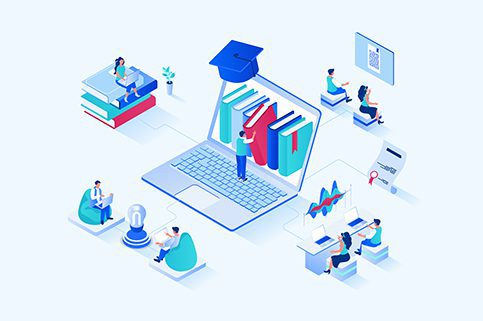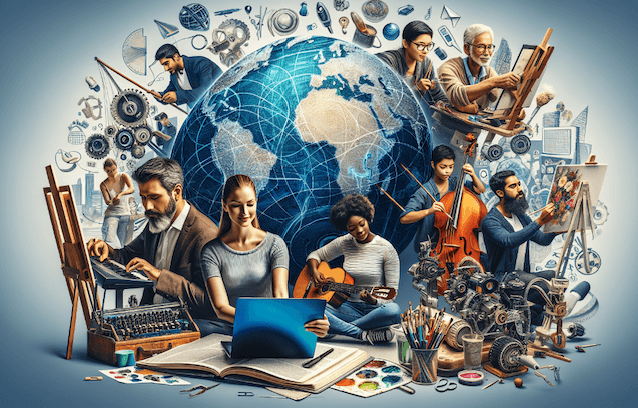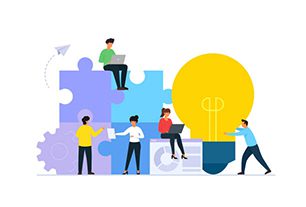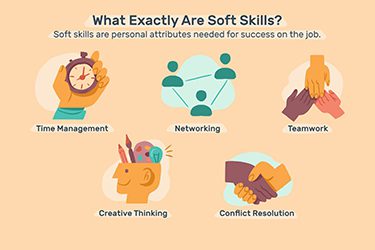Exploring the Importance of Skill Development in 2024 Today’s World
Exploring the Importance of Skill Development in 2024 Today’s World
In today’s rapidly evolving world, skill development has emerged as a key player in shaping the future of education and the global labor market. Influenced by global megatrends such as digitalization, automation, and an aging workforce, the demand for a robust set of skills—including digital, foundational, socio-emotional, and specialized skills is more critical than ever. This shift underscores the importance of continuously enhancing skill sets to stay relevant and competitive, not just for individual growth but for economic advancement and the green digital transition. Whether it’s through initiatives like the Haryana Skill Development Mission, the Ministry of Skill Development and Entrepreneurship, or the National Skill Development Corporation, the focus on upskilling and reskilling highlights the pathway towards achieving productivity, innovation, and adaptability in the workforce.
As we delve deeper into the topic, this article will guide you through the intricate landscape of skill development—from understanding the essential skills for personal and professional growth to exploring effective strategies for skill enhancement. Additionally, we’ll examine the pivotal roles of education, mentorship, and self-help resources in facilitating this journey. By incorporating skills into your daily routine and overcoming challenges in skill development, you’ll be equipped to measure progress and achieve significant milestones in personal development. With a spotlight on lifelong learning and vocational training, this discussion aims to furnish you with insightful knowledge and practical tips to navigate the realms of skill development efficiently.
Understanding Personal Development Skills
Personal development skills encompass a broad range of qualities and abilities that are crucial for both personal and professional growth. These skills include, but are not limited to, active listening, problem-solving, adaptability, leadership, and self-motivation.
By fostering these abilities, individuals can effectively set and achieve goals, advance in their careers, and enhance their overall life satisfaction and fulfillment.
Categories of Personal Development Skills
- Cognitive Skills: These involve mental capabilities like problem-solving, decision-making, and learning agility. Cognitive skills are essential for analyzing situations and coming up with effective solutions.
- Technical Skills: These are the abilities and knowledge needed to perform specific tasks. Technical skills are often related to IT, mechanics, or other fields that require specialized knowledge.
- Interpersonal Skills: Also known as soft skills, these include emotional intelligence, communication abilities, and teamwork capabilities. They are crucial for successfully interacting and collaborating with others in various settings.
Personal development is a continuous journey that involves introspection and action to improve one’s skills and quality of life. It includes various aspects such as mental, social, emotional, spiritual, and physical growth. Each area contributes to a well-rounded individual capable of handling different life situations effectively. By engaging in activities that enhance these skills, such as seeking feedback, networking, and finding mentors, individuals can create strategic plans that guide their personal and professional trajectories.
Top Skills for Personal and Professional Growth
In today’s competitive landscape, certain skills stand out as particularly crucial for personal and professional advancement. Understanding and developing these skills can significantly enhance your marketability and workplace efficiency.
Digital Literacy
As we navigate an increasingly digital world, the ability to understand and use technology is indispensable. Digital literacy goes beyond basic computer skills to include the savvy use of social media, understanding data privacy, and the ability to work with digital collaboration tools. This skill set is vital not only for tech-based roles but for virtually all career fields in the modern workforce.
Soft Skills
A robust set of soft skills can set you apart in any professional setting. Key areas include:
- Communication: The ability to clearly express ideas and effectively listen to others is fundamental. This includes both verbal and written communication skills.
- Problem-solving: Employers value individuals who can creatively tackle problems and devise effective solutions.
- Cooperation: Being able to work well in a team and collaborate with others is crucial, especially in projects involving multiple stakeholders.
These skills enhance work culture and contribute to higher employee satisfaction by improving interactions and reducing conflicts.
Flexibility and Adaptability
The modern workplace is ever-changing. Being flexible and able to adapt to new roles, responsibilities, or changes in the business environment is a highly valued trait. This includes being receptive to feedback and constructive criticism, which are critical for personal growth and career advancement.
By focusing on these key areas, you can better prepare yourself to meet the demands of current and future job markets, ensuring a more dynamic and successful career path.
Strategies for Enhancing Your Skills
To effectively enhance your skills in today’s competitive environment, it’s crucial to adopt a proactive and structured approach. Here are some practical strategies that can help you on this journey:
Identify and Confront Uncomfortable Areas
- Public Speaking: If the idea of speaking in front of a crowd makes you nervous, consider joining a local or online public speaking club.
- Taking Risks: Start with small risks to build your confidence, like pitching a new idea at work.
- Initiating Conversations: Practice by attending networking events or striking up conversations at community gatherings.
Continuous Learning and Skill Acquisition
- Expand Knowledge: Make it a habit to read books and articles that challenge your understanding and expand your worldview.
- Learn New Skills: Whether it’s a new language or a software tool, use online platforms like Coursera or Udemy to find relevant courses.
- Seek Feedback: Regularly ask for constructive criticism from trusted colleagues or mentors to identify areas for improvement.
Building and Utilizing a Support Network
- Develop Relationships: Engage with professionals in your field through industry organizations or social media platforms like LinkedIn.
- Find a Mentor: Look for someone who has the expertise in your area of interest and is willing to guide you.
- Engage in Peer Learning: This could involve forming a study group or joining forums where skills and knowledge are shared openly.
By integrating these strategies into your routine, you can enhance your personal and professional capabilities, making you more adaptable and proficient in your career path.
The Role of Education and Mentorship
Education and mentorship are pivotal in fostering skill development, particularly in professional settings. Mentorship, especially, serves as a cornerstone for both personal and professional growth. Mentors in various educational and professional fields act not only as advisors but also as role models and guides. They provide invaluable insights into industry practices, enhancing mentees’ understanding and helping them navigate complex career paths. This guidance is crucial as it helps in polishing skills that are essential for career advancement and adapting to organizational changes.
Effective mentorship programs are characterized by the active involvement of mentors who are equipped with essential skills such as empathy, effective communication, and strategic planning. These programs often extend beyond traditional learning environments, incorporating real-world applications and continuous feedback mechanisms. For instance, mentors help identify skills gaps and provide tailored guidance to bridge these gaps, thereby enhancing the mentee’s ability to take on more responsibilities or advance in their career. Moreover, mentorship creates a supportive learning environment that encourages continuous professional development and network expansion.
Incorporating technology can significantly enhance the efficacy of mentorship programs. Tools like mentoring software not only streamline administrative tasks but also offer features like AI-powered matching and customizable progress tracking. This technology supports the development of more structured and impactful mentorship programs, which are crucial for addressing skill shortages and boosting employee engagement and loyalty. By leveraging these advanced tools, organizations can create a more dynamic and supportive learning environment that fosters skill development and prepares employees for future challenges.
Leveraging Self-Help Resources
In the realm of personal development, leveraging self-help resources can be a transformative strategy to enhance your skills and knowledge. A multitude of platforms and tools are available that cater to a wide range of learning needs and styles. For instance, websites like Lifehack and MindBodyGreen provide articles and tips on improving lifestyle, motivation, and mental health, while platforms like EdApp offer structured courses with user analytics to track your learning progress.
Online Learning Platforms and Books
- EdApp: This platform not only offers courses but also provides detailed analytics on your learning progress, helping you identify areas of improvement.
- Heroic: Offers comprehensive resources including book summaries and video lessons tailored for self-improvement.
- Coursera and Udemy: These platforms provide access to a plethora of courses ranging from technical skills to personal development.
- Books: Titles like “The 7 Habits of Highly Effective People” and “The Willpower Instinct” offer deep insights into personal growth and effective habit formation.
Engaging with Interactive Tools
- Rapid Refresh by EdApp: An intuitive tool that allows you to create and schedule quizzes, making learning a more active and engaging process.
- The Write Practice: Combines practical writing advice with interactive elements to enhance your writing skills.
- StumbleUpon: This platform introduces you to a community with similar interests, enhancing learning through social interaction.
By incorporating these resources into your daily routine, you can make significant strides in your personal development journey. Engaging regularly with these tools not only broadens your knowledge but also keeps you motivated and committed to your growth.
Incorporating Skills into Daily Routines
To seamlessly integrate skill development into your daily routines, it’s essential to establish clear and attainable goals. Using the SMART framework, start by setting specific, measurable, achievable, relevant, and time-bound objectives. This method ensures that your learning targets are well-defined and trackable, making it easier to monitor your progress and stay motivated. For instance, if your goal is to enhance your digital literacy, you might aim to master a specific software tool within three months by dedicating thirty minutes daily to tutorials and practice.
Once your goals are set, select learning resources that resonate with your personal style and pace. This could involve choosing interactive online courses, engaging video tutorials, or comprehensive e-books. By aligning these resources with your preferred learning methods, you can enhance your retention and enjoyment of the material. For practical application, schedule short, focused learning sessions throughout your day. Perhaps you could listen to a relevant podcast during your morning commute and follow up with a quick quiz over lunch to test what you’ve learned.
Incorporating feedback and reflection into your routine is crucial for effective skill development. Regularly practice your new skills—whether it’s using a new software at work or applying a management technique—and seek feedback from peers or mentors. This input can help refine your approach and correct any missteps early on. Additionally, keep a journal or use apps like Evernote to reflect on what you’ve learned each day. This not only reinforces your knowledge but also encourages a routine of continuous improvement and personal growth.
Overcoming Challenges in Skills Development
Fear of failure often acts as a significant barrier in the pursuit of skill development. Viewing failure as a stepping stone rather than a setback is crucial. Embrace each failure as a chance to learn and refine your approach. For instance, if a new software tool proves challenging, analyze what aspects are causing difficulty and seek specific resources to overcome these hurdles.
Negative self-talk and doubt can severely impact your confidence, making it harder to pursue new skills or opportunities. To combat this, practice self-compassion and regularly engage in positive affirmations. Remind yourself of your past successes and keep a journal to document and celebrate your progress in skill development. This practice can reinforce a positive mindset and boost your motivation.
Setting clear, actionable goals is essential to prevent stagnation in your skill development journey. Break down your main objectives into smaller, manageable tasks and set deadlines for each. This method not only keeps you focused but also provides a clear roadmap to follow, making the process less overwhelming. Regularly review and adjust your goals as needed to stay aligned with your evolving aspirations and career demands.
Measuring Progress in Personal Development
To effectively measure progress in personal development, particularly in professional settings, a structured approach is essential. Regular skill evaluations are crucial as they help pinpoint areas where employees may be deficient, allowing for the customization of training programs to address these specific gaps. Tailoring training to fit organizational needs not only addresses direct skill shortages but also aligns employee development with the company’s overarching goals.
Utilizing Tools for Effective Skill Assessment
A variety of tools can be employed to manage and measure skill development effectively:
- Skills Matrix: This tool allows you to report on skill and competency levels in real time, providing a clear overview of where improvements are needed.
- Skills Assessment: Employing a proven measurement approach helps in accurately gauging employee skills and competencies.
- Learning Portfolio: An online platform that showcases a collection of artifacts such as certificates, projects, and feedback, which collectively demonstrate skills development over time.
These tools not only facilitate a thorough assessment of current proficiencies but also help in planning future development paths tailored to individual career goals.
Setting and Tracking Goals with SMART Criteria
To track skills development effectively, setting SMART goals—Specific, Measurable, Achievable, Relevant, and Time-bound—is vital. This approach ensures that objectives are clear and actionable. For instance, a skills matrix can be used to list relevant skills and rate proficiency on a scale from 1 to 5, comparing current levels with desired standards. Regular reviews and reflections on this data help celebrate successes, learn from mistakes, and strategically plan next steps, ensuring continuous professional growth.
By integrating these methodologies into regular practice, organizations and individuals can not only keep pace with industry demands but also foster an environment of continuous improvement and high performance.
Conclusion
Through this in-depth exploration, we’ve uncovered the multifaceted importance of skill development in our contemporary society, highlighting its pivotal role in personal growth, career advancement, and staying relevant in the ever-evolving job market. From the essential digital, cognitive, and interpersonal skills to strategies for learning and overcoming obstacles in skill acquisition, our journey underscores the significance of continually enhancing our abilities. The discussion on education and mentorship further revealed how guidance and structured learning paths could drastically improve our skill sets, preparing us for the challenges of a digital and automated future.
In light of the insights shared, it’s clear that adopting a proactive approach to personal and professional development is more crucial than ever. By leveraging technology, educational resources, and the support of mentors, we can navigate the complexities of skill development with greater ease and efficacy. As we strive towards our development goals, reflecting on our progress and continuously adapting our strategies will ensure we not only meet but exceed the demands of our dynamic world. Let us commit to this journey of lifelong learning and skill enhancement, fostering a future where individuals and organizations alike can thrive amidst the complexities of the 21st century.
Developing skills enhances your professional competency and effectiveness in your job role, making them invaluable in any professional setting. Through education and experience, you can acquire and refine these skills, which in turn, increases your chances of securing a job or advancing in your career. Essential skills are crucial as they enable individuals to perform job-related tasks efficiently, serve as a foundation for acquiring additional skills, and improve the capacity to innovate and adapt to changes in the workplace. Key essential skills include reading and comprehension.
FAQs
1. What is the significance of skills in the modern professional environment?
In today’s world, characterized by continuous change and unpredictability, possessing skills like problem-solving, critical thinking, creativity, and adaptability is essential. These skills enable individuals to effectively tackle challenges and devise innovative solutions, making them invaluable in any professional setting.
2. How does skill development benefit your career?
Developing skills enhances your professional competency and effectiveness in your job role. Through education and experience, you can acquire and refine these skills, which in turn, increases your chances of securing a job or advancing in your career.
3. What makes the development of essential skills crucial?
Essential skills are vital as they enable individuals to perform job-related tasks efficiently, serve as a foundation for acquiring additional skills, and improve the capacity to innovate and adapt to changes in the workplace. Key essential skills include reading and comprehension.





